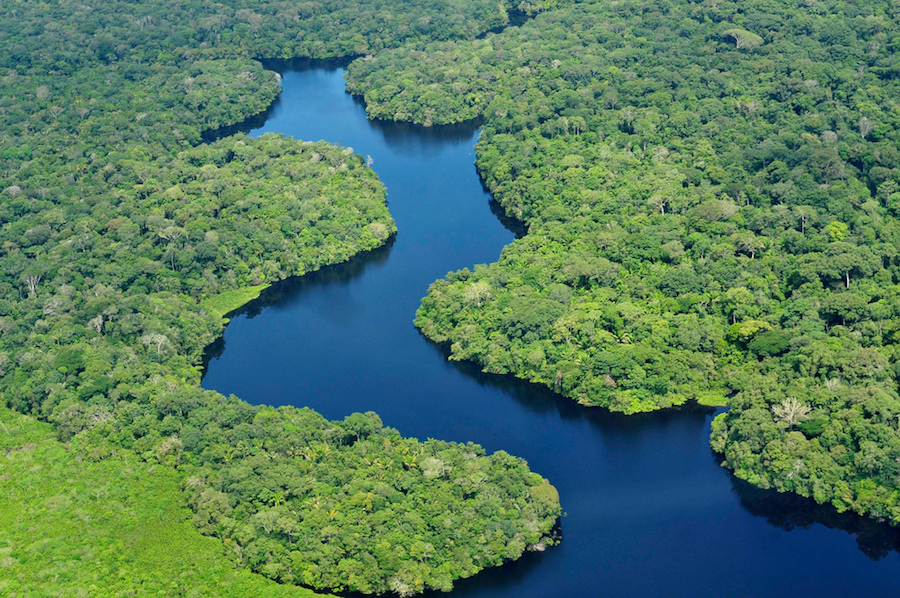After rainforest victory for Brazil’s environmentalists, a mining battle looms

By R.T. Watson
Opponents of unbridled development of Brazil’s Amazon region scored a victory this week when environmentalists fronted by supermodel Gisele Bundchen persuaded President Michel Temer to veto legislation that would have removed protections on more than 1 million acres.
A battle over Amazon land about 300 times that size may be looming.
The mining ministry has proposed legislation that would end a nearly 40-year ban on foreign-owned mining companies operating on land near the roughly 16,000-kilometer (10,000-mile) border. The zone, which extends about 150 kilometers inland, accounts for 27 percent of Brazil’s national territory, according to the mining ministry.

Because most of Brazil’s western border also incorporates parts of the world’s largest rainforest, the amount of Amazon biome in the border zone would total more than 1.7 million square kilometers, an area about the size of Alaska, or more than twice the size of Texas.
The legislation is expected to be presented to Brazil’s Congress by the end of this year.
The proposal is another indication of the zeal among some policymakers to further exploit the country’s vast natural resources and boost economic activity in a time of recession. Mining Minister Fernando Coelho Filho spoke about the idea briefly in January at the World Economic Forum in Davos, saying the measure should help attract foreign investment.
Opening the borders to foreign companies would constitute a shift in Brazil’s national-security strategy. Protecting the border zone, a holdover from the military government of the 1960s through the ’80s, came in conjunction with official efforts to establish a greater foothold in the sparsely populated regions rich in natural resources. What followed was a series of developmental initiatives that kick-started heavy deforestation of the Amazon area.
Common Ground
The mining ministry gave more details of its new border thinking in an emailed response to questions earlier this month. It said the current law “has a restrictive impact on the development of mining activity” and the country should search for common ground between promoting economic activity and maintaining border security.
The ministry made no mention of environmental protections.
“We need to take the borders from the paper’s crime section and put them instead in with the economy pages,” mining ministry secretary Vicente Lobo said at an event in Brasilia on Wednesday.
Lobo also said that the project is sound and has been discussed several times with both security and defense officials. He added it’s up to the senate to discuss and regulate the proposal.

Environmentalists fronted by supermodel Gisele Bundchen (pictured) persuaded President Michel Temer to veto legislation that would have removed protections on more than 1 million acres of Brazil’s Amazon. (Image: Wikimedia Commons)
‘17th Century’
Although the initiative probably wouldn’t lead to the level of land-clearing caused by agribusiness or logging operations, according to Jaime Gesisky, a public policy specialist at WWF-Brasil, it’s still a worrisome proposal because of the potential risks of water contamination in protected areas or conflicts with indigenous groups.
Overall, he said the move represented a return to failed policies.
“We can’t be imagining the Amazon of the future and then be thinking of behaving like it’s the 17th century where you just show up, extract wealth and then clear out,” Gesisky said by telephone from Brasilia. “We have to think of a more appropriate mode of development.”
The amount of mineral wealth inside Brazil’s Amazon border regions is “considerably unknown,” according to Breno Augusto dos Santos, a Brazilian geologist with a knowledge of the region that stretches back to the 1960s. Currently, most mining in the difficult-to-access areas along borders with such countries as Colombia and Venezuela has been illegal gold prospecting.
Mineral Riches
Dos Santos is credited with discovering one of the biggest iron-ore reserves in the world, known as Carajas, in the Amazon. Just this year, Rio de Janeiro-based Vale SA, the world’s biggest iron-ore miner, started commercial shipments of high-grade ore from S11D, a $14 billion project in Carajas considered the industry’s largest.
Though he says it hasn’t been confirmed, Dos Santos said the protected border regions may hold more than a dozen valuable minerals including gold, silver, platinum, titanium, uranium and diamonds.
Brazil’s National Committee for the Defense of Territories Against Mining doesn’t support opening border areas to foreign companies for reasons of sovereignty and safety. It cites the risk of another disaster similar to one that claimed as many as 19 lives in late 2015 at an iron-ore mine co-owned by Vale and BHP Billiton Ltd.
“Look at what already happens with Brazilian mining companies,” Katia Visentainer, a spokeswoman for the group, said by telephone from Sao Paulo. “Even with as strict as rules as we have, they do what they want. Imagine what will happen if you open up the border areas to foreign companies.”
{{ commodity.name }}
{{ post.title }}
{{ post.date }}




Comments